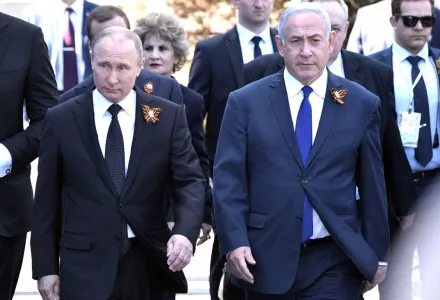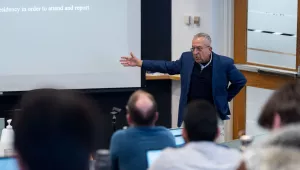
Note
A Hebrew-language version of the op-ed appeared in Haaretz on July 18, 2018. The translation was provided by the author.
In recent years Russia has staged a comeback in the Mideast, big time, to the extent that it may replace the United States as the leading foreign power in the region. Russia's success has been a combination of both deft diplomacy as well as weapons and nuclear reactor sales to states throughout the region, from Iran to Morocco. The weakness of U.S. regional policy under the Obama administration, followed by the total chaos under Trump, have further contributed to Russia's success. Russian policy has been sophisticated, but has also benefited from the void left by the United States.
President Putin's fundamental strategic objective is to restore Russian global leadership, or to put it somewhat less delicately, to stick it to the United States wherever possible. His primary problem is that Russia does not have that much to offer today, it cannot compete with the United States and Western countries on an economic level, or alternatively on a diplomatic one, and all it does have to offer is weapons, nuclear technology, and energy.
The Middle East is one of the primary regions in the world in which Russia can pursue its ambitions today. Most global weapons sales are with Middle Eastern states, and a race is underway among them to procure nuclear power reactors. Moscow's willingness to sell them weapons and reactors, and to maintain close relations with rogue regimes such as those in Damascus and Teheran, provide it with a degree of influence that it does not have in much of the rest of the world.
In Syria, with a minimal deployment of two fighter squadrons, Russia succeeded in turning the tide in the civil war, stabilized the Assad regime, and defended it from accusations that it had repeatedly used chemical weapons, despite the clear proof that it has done so. Russia allowed Iran and its affiliated militias to do the bleeding on the ground in Syria, while it hardly paid any price at all for intervening. In so doing, it has put paid to Obama's fears of intervention, lest the United States become mired in the Syrian quagmire, and his prophecy that Syria would become the Russian Vietnam.
The fact that Russia is the only player in Syria today that maintains relations with all of the sides involved has turned it into the leading actor there and the only one that just may be able to bring about a diplomatic resolution of the domestic crisis and prevent a direct conflict between Iran and Israel. Russia has also succeeding in ensuring that its presence in Syria, in the Hamimim airbase and Latakia naval base, will be for the long-term. Advanced S300 and S400 air defense systems — manned so far solely by Russian personnel — have been deployed in Syria to defend these bases, which provide Russia with the ability to project power throughout the Middle East.
In Egypt, after four decades in which Cairo has been aligned entirely with the United States, Putin succeeded in using the regime's anger towards Washington, following Mubarak's ouster and U.S. sanctions on arms sales, in order to deepen relations. Military ties have been renewed, including the sale of approximately fifty MIG 29 fighters and a similar number of attack helicopters, S300 missiles, and joint military exercises. The two countries are now cooperating in Libya, including the deployment of a small Russian military force in western Egypt. Last year a deal was concluded for the provision of four Russian nuclear power reactors to Egypt.
Saudi Arabia, which has long lived under an American security umbrella, is now afraid to continue placing all of its "strategic eggs" in the American basket and has also improved ties with Russia. The first visit ever of a Saudi king in Russia took place last year, and the crown prince has also visited since then. A deal for the sale of S400 and antitank missiles has been signed, as well as a nuclear cooperation agreement, in preparation for Russian participation in a Saudi tender for the first two out of sixteen planned nuclear power reactors. Saudi Arabia and Russia, which jointly account for some 20 percent of the world's oil production, have also begun investing in joint energy projects and, more importantly, to coordinate moves in order to bring about a cut in the global supply of oil and a price hike.
For decades Russia has maintained a strategic relationship with Iran. A Security Council resolution prevents resumption of arms sales to Iran until 2020, but talks are underway regarding the sale of fighter aircraft, tanks, and artillery, and Russia has already supplied Iran with S300 missiles. The U.S. withdrawal from the nuclear agreement and the resumption of sanctions on Iran, make it even more dependent on Moscow and both strategic and economic cooperation between the two, including a possible free-trade zone, is expanding further.
Turkey is going ahead with the purchase of S400 missiles, over the protestations of its NATO allies and despite the threat the deal poses to the future of the alliance. Morocco, Bahrain, and Qatar are also interested in the S400. Russia has concluded large arms sales with the UAE and a nuclear cooperation agreement with Tunisia. Russia is now interested in naval bases in Libya.
Lebanon, too, has become a focus of Russian interest, in the attempt to reduce U.S. influence in that country. Russia has offered Lebanon a large arms sale at zero interest and expressed interest in air and naval bases. Russian firms have also competed for oil and gas exploration tenders in Lebanese territorial waters. Russian weapons have reached Hezbollah, apparently through Syria and/or Iran, without Moscow making a major effort to prevent this.
At the same time that it has deepened ties with Arab states, Russia has also succeeded in establishing a strong relationship with Israel and creating growing Israeli dependence on it. Iranian entrenchment in Syria and the prospects of a direct Israeli-Iranian conflict, with Hezbollah as well, depend to a large extent today on Moscow. As the only power that has strategic relations with Iran, the crisis over its nuclear program, following the U.S. withdrawal from the nuclear agreement, may provide Russia with a unique role in the efforts to bring the sides back to the table and to reach a "better" deal. It is not for nothing that Prime Minister Netanyahu has repeatedly made urgent visits to Moscow every few months.
The United States is Israel's strategic ally, but it has adopted a diminished role on issues of vital importance for Israel’s national security, making Israel increasingly dependent on Moscow. There have been conflicting reports so far regarding Moscow's willingness to take Israel's security concerns into account. Trump has sought to disrupt long-established strategic realities everywhere. In the Middle East, he has succeeded in causing mayhem, clearing the way for Russia and Iran.
Statements and views expressed in this commentary are solely those of the author and do not imply endorsement by Harvard University, the Harvard Kennedy School, or the Belfer Center for Science and International Affairs.
Freilich, Chuck."How Russia Is Taking Over the Middle East, One Country at a Time." Belfer Center for Science and International Affairs, Harvard Kennedy School, July 19, 2018.





